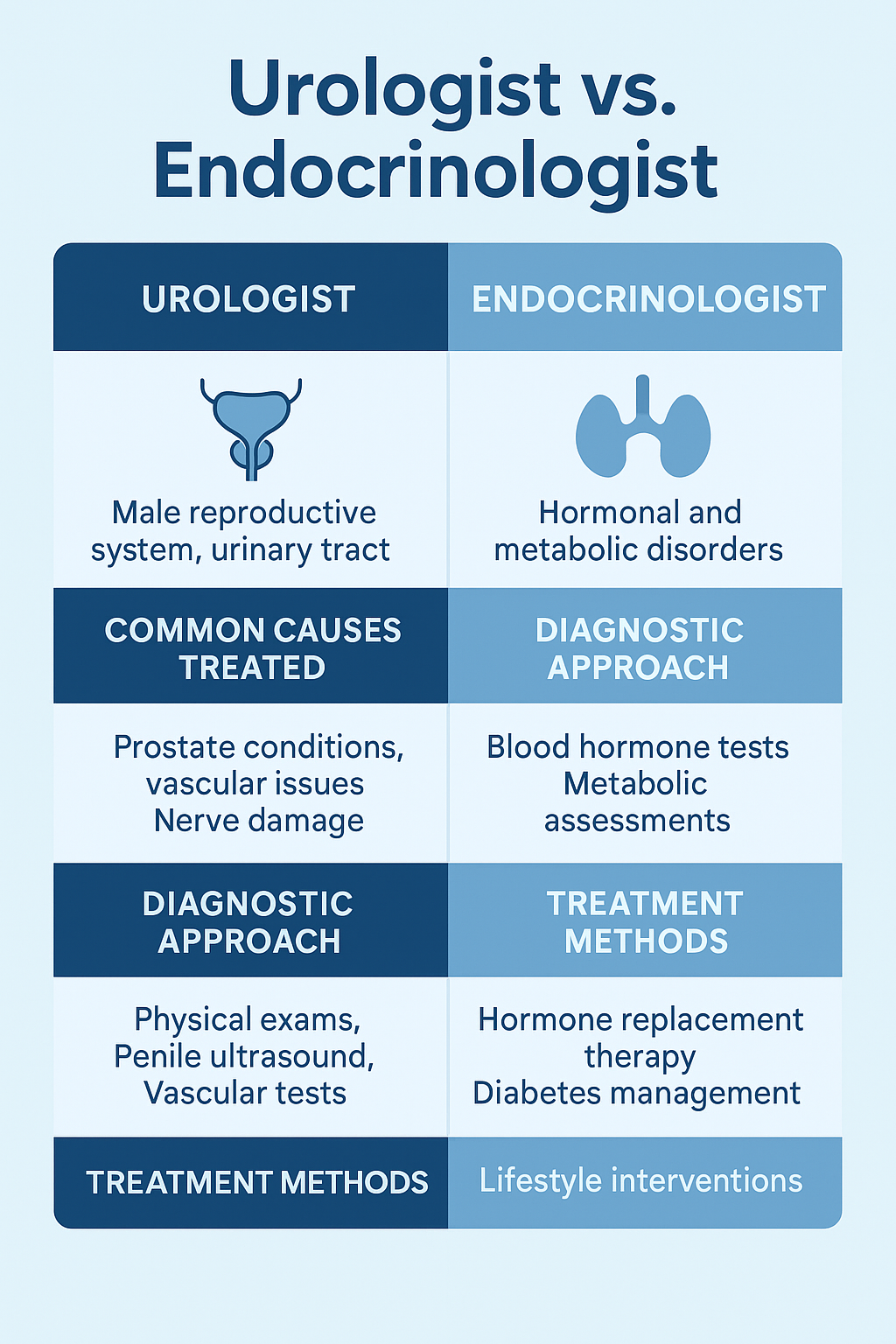Erectile dysfunction (ED) is a common condition that affects many men, impacting both physical health and emotional well-being. It can lead to frustration, stress and relationship difficulties if left untreated. Choosing the right medical specialist for diagnosis and treatment is essential for addressing the root cause of ED and finding an effective solution. Urologists and endocrinologists are two key ED specialists, each with a different focus on the underlying causes of the condition. Understanding their roles can help determine which one is best suited to your issues.
Understanding the Role of a Urologist in ED Treatment
A urologist specialist is a doctor who focuses on the urinary tract and male reproductive system. These specialists diagnose and treat conditions affecting the bladder, kidneys, prostate and penis. When it comes to ED, urologists play a crucial role in identifying and managing physical and structural causes of erectile dysfunction.
Urologists commonly treat ED cases linked to prostate issues, nerve damage or vascular problems affecting blood flow to the penis. During an evaluation, a urologist may conduct various tests and procedures to determine the cause of ED, such as:
- Physical examination to assess penile and testicular health
- Penile ultrasound to evaluate blood flow and detect vascular abnormalities
- Testosterone and other hormone level tests to check for imbalances that may contribute to ED
Once diagnosed, a urologist can provide a range of treatment options, including:
- Oral medications such as sildenafil (Viagra) or tadalafil (Cialis)
- Penile injections that help stimulate blood flow
- ED Shockwave Therapy to improve erectile function naturally
- Penile implants or surgery for severe cases of ED that do not respond to other treatments
Urologists are particularly beneficial for patients with prostate conditions, Peyronie’s disease or vascular-related ED.

Understanding the Role of an Endocrinologist in ED Treatment
An endocrinologist is a specialist who focuses on hormonal imbalances and disorders related to the endocrine system. Hormones play a vital role in many bodily functions, including sexual health and performance. If ED is suspected to be linked to low testosterone (Low T), thyroid disorders, diabetes or other metabolic conditions, an endocrinologist may be the right specialist to consult.
Hormonal imbalances can significantly impact erectile function. Low testosterone levels, for example, can lead to reduced libido and difficulty maintaining an erection. Conditions such as diabetes can damage nerves and blood vessels, further contributing to ED. An endocrinologist will conduct various tests to identify any hormonal or metabolic disorders, including:
- Hormone level assessments to check testosterone, prolactin and thyroid function
- Blood sugar tests to assess diabetes and insulin resistance
- Lipid and cholesterol panels to evaluate metabolic health
Treatment options provided by an endocrinologist may include:
- Testosterone replacement therapy (TRT) to restore hormone balance
- Diabetes management plans including medications and lifestyle modifications
- Thyroid or adrenal gland treatments to address underlying endocrine issues
- Dietary and weight management advice to reduce metabolic risk factors
If ED is caused by an underlying hormonal disorder or metabolic condition, an endocrinologist can help restore balance and improve sexual function.
Key Differences Between a Urologist and an Endocrinologist
Both urologists and endocrinologists play essential roles in ED diagnosis and treatment, but their areas of expertise differ. The table below highlights key differences between these ED specialists:

Both specialists may work together if ED is caused by a combination of hormonal and physical factors.
How to Decide Which Specialist to See
The right specialist depends on the suspected cause of ED. If symptoms suggest vascular or nerve-related issues, a urologist may be the best option. A urologist should be consulted if ED is linked to conditions such as prostate disease, Peyronie’s disease or blood flow problems.
On the other hand, if ED symptoms are accompanied by low energy, weight gain, diabetes or thyroid dysfunction, an endocrinologist can assess whether hormonal imbalances are contributing to the problem. Men experiencing low libido, fatigue, or unexplained changes in body composition should consider consulting an endocrinologist.
For comprehensive care, seeing both a urologist specialist and an endocrinologist may be beneficial. Working with both ED specialists ensures that all possible causes of ED are explored, leading to more effective treatment.
If unsure which doctor to visit, a general practitioner (GP) can provide an initial evaluation and refer the patient to the appropriate specialist based on symptoms and medical history.
Finding the Right Specialist for ED Treatment
Choosing between a urologist and an endocrinologist depends on individual symptoms and underlying health conditions. Urologists focus on structural and vascular-related issues, while endocrinologists specialise in hormonal imbalances and metabolic health. For the best results, a multidisciplinary approach may be required.
Seeking medical help for ED is an important step toward improving sexual health and overall well-being. Early diagnosis and treatment can restore confidence, enhance relationships and improve quality of life.


